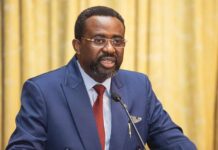Venezuelan diplomat, Alex Saab, is insisting that a Miami Judge, erred in its ruling when it gave the US government the go ahead to continue with processes that will see face criminal charges.
In his opening states submitted at the US Court of Appeals, Alex Saab stressed that his diplomatic status grants him immunity from such processes.
The special business envoy has petitioned the Eleventh Circuit to acknowledge his diplomatic immunity and throw out the US government’s case against him.
The US has charged Alex Saab with money laundering, saying that he used US banks to launder funds for a $350million bribery scheme.
Even though Swiss Prosecutors have concluded that there is insufficient evidence to back these claims after about a three-year investigation, the US is collaborating with Cape Verde to prosecute Mr. Saab.
Miami Judge, Robert Scola, in his ruling, tagged Saab as a US fugitive, but this description has been rejected by the Venezuelan diplomat.
In the statement, he said that such a description was not proper since he was not physically present in the US when he was slapped with the charges.
He further said that his refusal to comply with the US government’s extradition request was based on instructions from the Venezuelan government.
He that “his ultimate choice was to obey the sovereign that directly commanded his allegiance”
His attorney, David Rivkin says that such a position from the US government is absurd.
“The State Department does not, and practicably, cannot, maintain a registry of all the foreign diplomats in the world. Doing so would violate the sovereign dignity of other countries. If France wants to send someone to Berlin, you don’t ask the State Department for an approval – it’s absurd,” Mr. Rivkin said during a Wednesday call with Law360.
Alex Saab’s legal team in Cape Verde are engaged in a similar litigation.
They have filed a case at Cape Verde’s Constitutional Court to reverse a ruling by the apex court that urged local authorities to continue with extradition processes.
Several authorities including the ECOWAS Court and the United Nations Human Rights Committee has directed the release of Mr. Saab but the Cape Verdean government has not acted in compliance.
Lawyer for Mr. Saab at the ECOWAS Court, Femi Falana believes that the US is influencing Cape Verde’s decision on the matter.
A recent move by the US to invest $400million in Cape Verde has been interpreted to back Mr. Falana’s assertion.
Some have described the planned investment as a carrot that is being dangled before Cape Verde as it was announced days ahead of the Constitutional Court’s ruling.
There are fears that Cape Verde’a handling of the matter will have severe implications for diplomatic relations in the future.










